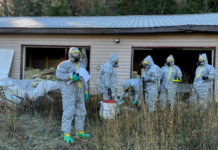The Saskatchewan Court of Appeal has overturned the eight-year sentence of a man convicted of drug trafficking and illegal firearms possession under the Good Samaritan Act, marking one of the first decisions of its kind in Canada.
The Good Samaritan Act, which has been in place for six years, protects people from prosecution if they were charged as a result of seeking assistance for someone in need of medical attention and remaining with them at the scene.
That was the case brought before Saskatchewan Court of Appeal Justice Robert Leurer regarding the conviction of Paul Eric Wilson.
On Sept. 10, 2020, Wilson was arrested while driving a car with three other passengers in Vanscoy, Sask., according to court documents obtained by CBC News.
The Warman RCMP were responding to reports of a drug overdose, called in by Wilson himself. Upon arrival, officers detained Wilson and the other passengers to inspect his vehicle.
“Incidental to the arrest for simple possession, the officers searched the truck and several bags were located therein,” said Leurer.
After searching the vehicle RCMP discovered modified firearms and what were presumably parts for firearms and ammunition. They also found bags with scales, baggies and needles, all the paraphernalia of drug trafficking.
Wilson and the two other passengers were charged with firearm offences and drug trafficking. The remaining passenger was the one suspected of having an overdose due to fentanyl had been rushed to hospital and was not arrested.
“As it turned out, Mr. Wilson was not charged with possession of a controlled substance under s. 4(1) of the CDSA, despite that being the offence underlying his initial arrest, nor with any other offences under that Act,” said Leurer.
Wilson and the two other passengers were brought into police cells in Saskatoon after the search.
The Crown argued that the Good Samaritan Act shouldn’t apply in this case because while it does protect people from being charged or convicted, it doesn’t mean police aren’t able to make arrests and search property. The Crown cited the fact that Wilson was never charged with possession of a controlled substance.
Wilson’s defence argued that the search which led to the discovery of the incriminating items and subsequent charges was incidental to the first arrest which was “prohibited.”
“I agree with the Crown that it was proper for the officers to understand that Mr. Wilson was found committing a crime. However, as I will next discuss, I cannot agree with the Crown’s further submission that this nonetheless justified his arrest,” said Leurer.
Leurer made his decision based on the evidence that RCMP had violated two sections of Wilson’s Charter rights; Everyone has the right to be secure against unreasonable search or seizure; Everyone has the right not to be arbitrarily detained or imprisoned.
“It should have been obvious to the officers that no lawful purpose would be served by Mr. Wilson’s arrest,” said Leurer.
The decision marks one of the first times in Canada that the Good Samaritan Act has been applied to overturn a conviction, according to Pierre Hawking, legal counsel for the John Howard Society.
“We see this as the court sending a strong message to both police forces about arresting people in these situations and about training officers in those cases,” said Hawkins, who acted as an intervenor in Wilson’s case.
The purpose of the Good Samaritan Act is to incentivize people to call for help even if they are in a legally ambiguous circumstance. In this case, it was likely that Wilson’s call to paramedics saved the life of the person who had overdosed.
“It is likely that [Wilson’s friend] is alive only because one of her companions called 911. In her case, the objective of the Good Samaritan Act was achieved,” said Leurer.
What makes the Good Samaritan Act different from others is that it “relies on trust,” said Hawkins.
“Drug users have to trust that the police aren’t going to arrest them at the scene. They have to trust that the legislation is going to protect them, and so this decision from the court is a strong signal to them that they can trust that protection and they should trust that protection,” he said.





















